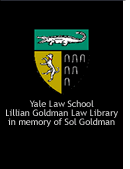
 |
 |
| This series of web pages relate to a seminar, Confronting Past Abuses, run by Professor Robert Burt, Alexander M. Bickel Professor of Law, the description of which is presented below: Confronting Past Abuses: The South African Experience: Research Seminar (21396). 3 units. Following the transition to majority rule, South Africa undertook to address human rights abuses perpetrated under the prior apartheid regime primarily through the work of a Truth and Reconciliation Commission (TRC), rather than exclusively relying on criminal accountability or ignoring the past abuses altogether. The proceedings of the TRC were extensively covered by the South African Broadcasting Corporation, and Yale Law School has assembled a completed collection of the tapes of that television coverage. The goal of this research seminar will be to assemble materials that would be made generally available for teaching and research purposes on the Law School Library Web site. The assembled material will include excerpts from the TRC videotapes, written and visual texts about the South African experience and comparative texts about the response (or failures to respond) to past abuses in international tribunals and in other countries emerging from dictatorship to democracies, especially in Latin America and Eastern Europe. Seminar students, acting individually or in small teams, will take principal responsibility for compiling this material, which will be discussed in the seminar sessions. We will rely on the technical skills of the Law School’s Computer Services staff to edit the material in a format suitable for the YLS web site. What was done: Having decided on a particular research topic, students in teams of two reviewed the videotape collection and then selected short video segments from the tapes that were relevant to their topic and which, when edited together, provided a coherent, flowing and logical story about that subject. Then, taking the edited video segments as a basis and utilizing synchronized multimedia integration language (SMIL), students created scripts that use the time code from the video to trigger other multi-media events, especially visits to web sites. Such web sites provide information that supplements the narrative in the video, e.g. a link to newspaper coverage of an incident under discussion, the TRC website where a transcript of a specific testimony is housed, a journal article or book that deals with the subject, or an institution where such issues are confronted. Much of a student’s time was spent on researching the topic and gathering together data from many, often disparate, sources. Please see below for abstracts of the topics covered in the Spring 2004 seminar – clicking on the link will take you to an introductory page and the SMIL presentation itself. Further information, including bibliography, annotated web sites, and other references is included on these pages. For help in using the SMIL as a tool for your research, please click here. |
||